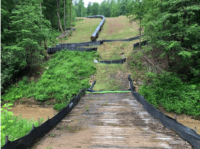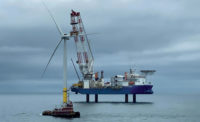A battle over construction of a high-voltage transmission line across the James River near historic sites in Virginia ramped up when the National Park Service's director asked the U.S. Army Corps of Engineers to deny a permit for the estimated $180-million project.
Dominion Virginia Power proposed the 500-kV crossing near Jamestown, Williamsburg and Yorktown, early settlements in North America, as a way to alleviate power shortages expected in the Hampton Roads region after two coal-fired units at the Yorktown generating station are retired in 2017.
“The proposed overhead line would ... cause severe and unacceptable damage to this historically important area and the irreplaceable and iconic national resources with it,” Park Service Director Jonathan Jarvis said in a letter in mid-December to the Corps chief, Lt. Gen. Thomas Bostick.
The transmission line would cross directly over the open water route of the Capt. John Smith Chesapeake National Historic Trail and would be within sight of Jamestown Island and the Colonial Parkway, Jarvis said. Towers would be as tall as 300 ft, according to opponents.
He asked Bostick to deny the permit for the overhead line and examine other solutions to address the power needs in the region through an environmental impact statement.
The project would access power from Dominion's Surry nuclear plant and transport it to the Hampton Roads region. Earlier studies by Dominion and the regional power grid operator identified the proposed project as needed to address thermal overloads, voltage problems and outages projected to occur beginning in the summer of 2019, according to the power firm.
“Although load forecasts have declined slightly since then, the line is still vitally needed. Now the key driver for accelerating this proposed transmission line project is the retirement of the Yorktown Power station,” Dominion said. The company has said the region could face rolling blackouts without the line.
However, a study commissioned by the National Parks Conservation Association released last month by consultant Princeton Energy Research International said that other strategies can meet the region’s near-term electric power needs without degrading the region’s historic character and environmental integrity.
Critical information was overlooked in evaluating the proposed line, and the forecast peak load growth has not materialized, the report said. Dominion’s analysis overstates peak demand growth by not incorporating the most recent demographic population shifts, according to Princeton Energy. "Recent trends and actual peak load data over the past decade show that the projection of 1.9% average peak load growth is too high,” the report said.
Dominion also underestimated demand-side management and the growth of distributed solar power, and failed to consider other alternatives, the report said.
But in an interview, Dominion spokeswoman Bonita Harris said the consultant's report "does not present any viable alternatives to resolving the reliability concerns for the peninsula.” She says its suggested alternatives were considered and would not address needs in the Hampton Roads area.
The conservation group also wants the permit denied and an environmental impact statement required, according to a spokesman.
But the Advisory Council on Historic Preservation, the federal agency that advises the President and Congress on national historic preservation policy, said in a separate letter to the Corps that a reasonable balance between the project’s goals and historic preservation values would be challenging.





Post a comment to this article
Report Abusive Comment